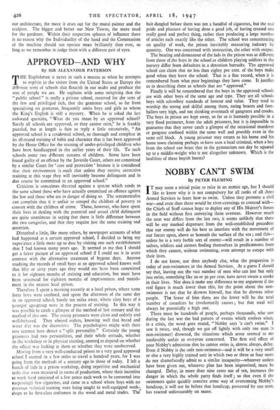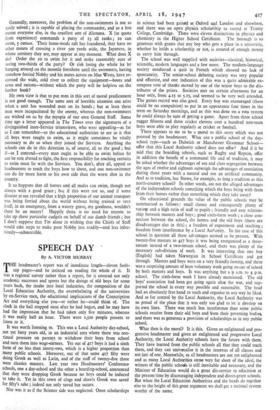NOBBY CAN'T SWIM
By PETER FLEMING
I T may seem a trivial point to raise in an atomic age, but I should like to know why it is not compulsory for all ranks of all three Armed Services to learn how to swim. Unless they promote a civil war—and even then there would be river-crossings to contend with— the Chiefs of Staff cannot hope to deploy any of His Majesty's forces in the field without first conveying them overseas. However much the next war differs from the last two, it seems unlikely that there will be any marked departure from the well-established precedent that our enemy will do his best to interfere with the movement of our forces upon, above or beneath the surface of the sea ; and this— unless he is a very feeble sort of enemy—will result in a number of sailors, soldiers and airmen finding themselves in predicaments from which they cannot, without swimming, even attempt to escape with their lives.
I do not know, nor does anybody else, what the proportion is today of non-swimmers in the Armed Services. At a guess I should say that, leaving out the vast number of men who can just but only just swim, something like 20 or 3o per cent. have never swum a stroke in their lives. . Nor does it make any difference to my argument if the real figure is much lower than this, for the point about the non- swimmer is not that he drowns himself, but that he drowns other people. Tht fewer of him there are the lower will be the total number of casualties he involuntarily causes ; but that total will always be potentially a high one.
There must be hundreds of people, perhaps thousands, who saw during the last war the bad pattern of events which evolves when, in a crisis, the word goes round, "Nobby says 'e can't swim." I saw it twice, and, though we got off lightly with only one man (a non-swimmer) drowned, the situations which arose seemed to me intolerably •unfair to everyone concerned. The first evil effect of poor Nobby's admission that he cannot swim is, almost always, delay. EYen if Nobby is the only non-swimmer—and it will be a very small or else a very highly trained unit in which two or three or four more do not shamefacedly admit to a similar incapacity—whatever orders have been given out, whatever plan has been improvised, must be changed. Delay, in more than nine cases out of ten, increases the danger in which the whole party finds itself ; so that even if the swimmers quite quickly contrive some way of overcoming Nobby's handicap, it will not be before that handicap, possessed by one man, has reacted unfavourably on many. Generally, moreover, the problem of the non-swimmers is not so easily solved ; it is capable of placing the commander, and to a less extent everyone else, in the cruellest sort of dilemmit. X (to quote from experience) commands a party of 15 all ranks ; so can swim, 5 cannot. Their home-made raft has foundered, they have no other means of crossing a river Soo yards wide, the Japanese, in whose territory they are, may appear at any moment. What does X do? Order the so to swim for it and make reasonably sure of saving two-thirds of the party? Or risk losing the whole lot by hanging around on the moonlit foreshore until the, swimmers, having somehow ferried Nobby and his mates across on Mae Wests, have re- crossed the wide, cold river to collect the equipment—boots and arms and rations—without which the party will be helpless on the further bank?
My own view is that to put men in this sort of moral predicament is not good enough. The same sort of horrible situation can arise when a unit has wounded men on its hands ; but at least these men were incapacitated by the enemy, whereas the non-swimmers are wished on us by the myopia of our own General Staff. Some time ago a letter appeared in The Times over the signatures of a distinguished inter-Service triumvirate, who were appealing—as far as I can remember—to the educational authorities to see to it that all boys were taught to swim, as it might sometimes be vitally necessary to do so when they joined the Services. Anything the schools can do in this direction is, of course, all to the good ; but if—as I contend—every man ought to be able to swim before he can be sent abroad to fight, the first responsibility for teaching recruits to swim must lie with the Services. You don't, after all, appeal to headmasters to teach the boys how to shoot, and one non-swimmer can do far more harm to his own side than the worst shot in the country.
It so happens that all horses and all mules can swim, though not always with a good grace ; but if this were not so, and if some disaster at sea revealed that a high proportion of our animal transport was being ferried about the world without being trained to save itself, in an emergency, from a watery grave, my goodness, wouldn't there be an outcry! Happily there is no need for anyone to take up these particular cudgels on behalf of our dumb friends ; but I don't suppose that I'm alone in wishing that the Chiefs of Staff would take steps to make poor Nobby less readily—and less infec- tiously—submersible.



































 Previous page
Previous page